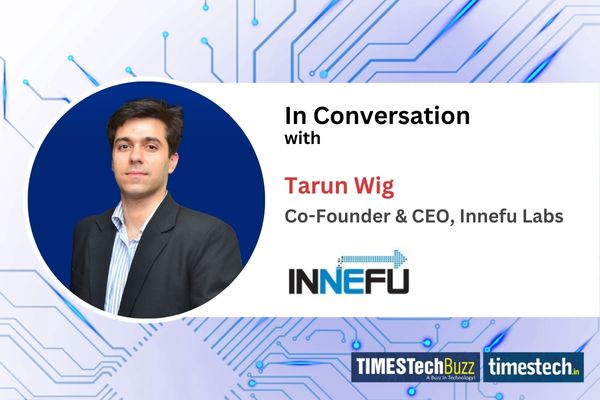In an interview with TimesTech, Tarun Wig, Co-Founder and CEO of Innefu Labs, shares how the company has become a trusted ally of India’s critical sectors. He discusses their AI-powered platforms, including PROPHECY, and how they are combating threats like deepfakes and misinformation. He also reflects on his entrepreneurial journey and outlines a strategic roadmap for India’s cybersecurity ecosystem.
Read the full interview here:
TimesTech: Innefu Labs has become a trusted partner for government and critical sectors. What strategic decisions or innovations do you believe have been key to earning this trust, especially among agencies like DRDO, Indian Army, and RBI?
Tarun: Our trustworthiness has been built on a foundation of deep technological innovation, strategic alignment with national security priorities, and a strong culture of delivery. From the beginning, we focused on solving real problems faced by national security organizations, rather than chasing trends. For example, our AI-driven platforms were developed in-house, tailored to Indian challenges—from counterterrorism and border security to financial fraud detection. We also ensured that all our data sovereignty and compliance standards exceeded the benchmarks set by our clients. Most importantly, we listened carefully—our platforms evolved based on extensive feedback from field officers, intelligence analysts, and government stakeholders. That constant feedback loop has been key.
TimesTech: PROPHECY, your AI-powered predictive intelligence platform, is being used for everything from predictive policing to biometric authentication. Could you walk us through a real-world success story where PROPHECY made a measurable impact?
Tarun: PROPHECY was deployed by one of India’s largest paramilitary forces to process massive volumes of incident and intelligence data. The platform identified infiltration routes, predicted hotspots for smuggling and cross-border activity, and even helped thwart narcotics smuggling worth over ₹5 crore. By providing 360° profiles of key entities and actionable insights, PROPHECY significantly improved force deployment and decision-making on the ground.
TimesTech: With India heading into election season, how is Innefu Labs tackling rising threats like deepfakes, misinformation, and digital fraud to protect democratic processes and public trust?
Tarun: We’ve enhanced our AI engines to detect deepfakes and synthetic media in real time, leveraging both content-based and contextual analysis. For misinformation, our NLP models scan thousands of sources across the web, social platforms, and the dark web to identify viral false narratives, especially those aimed at communal unrest or voter manipulation. For instance, we have recently published an OSINT report, tracking the rising wave of digital opposition and misinformation against the proposed Waqf Amendment Bill. The extensive research goes on to detail the online narrative and social media strategies organized to foment upheaval against public sentiment regarding the legislative proposition.
TimesTech: You’ve had a remarkable entrepreneurial journey, from founding Appin Knowledge Solutions to spearheading Innefu Labs. What lessons from your earlier ventures shaped the vision and technological foundation of Innefu?
Tarun: Innefu Labs has emerged from multiple experiences that both my co-founder Abhishek and I have had. We recognized the importance of indigenous cybersecurity products way back in 2010. We understood that a strong product ecosystem was required to strengthen the nation financially as well as technologically. We also recognized that integrity and ethics are critical values in business and that we should strive to deliver the highest quality products to satisfy our clients.
TimesTech: As someone who has been actively involved in consulting with ministries and state police forces, how do you see the role of AI evolving in public safety and intelligence operations over the next five years?
Tarun: AI will become the backbone of modern public safety architecture. We’re already seeing early adoption of predictive policing, facial recognition, and data-driven surveillance. Over the next five years, we’re pushing this frontier even further by merging AI with mechatronics—bringing together intelligent software and adaptive hardware to build autonomous, responsive systems for defense and internal security. Our vision is to augment human capability with intelligent machines, helping forces operate with greater speed, safety, and precision.
TimesTech: Given your expertise in both technology and policy, what steps should India’s cybersecurity ecosystem take to stay ahead of global threats while fostering innovation and data security in the private sector?
Tarun: First, we need a unified national cybersecurity framework that integrates efforts across ministries, defense, law enforcement, and the private sector. Second, incentivizing indigenous R&D is crucial—India cannot rely on imported tech for cyber defense. Third, cybersecurity needs to be a boardroom priority—not just a tech issue—especially in the Government and BFSI sectors. Finally, we must train the next generation of cyber professionals through targeted skilling initiatives and public-private partnerships. As threats grow more complex, our response must be collaborative, agile, and rooted in trust.

















